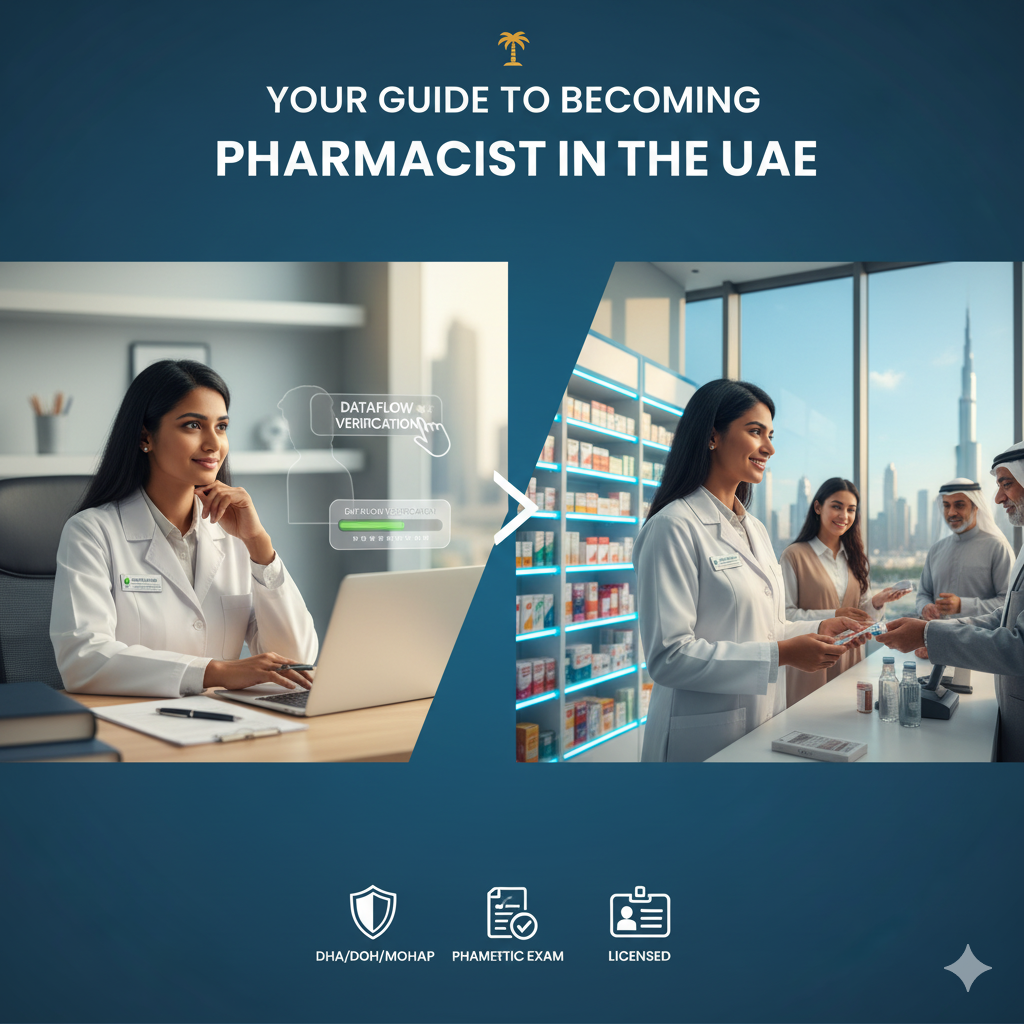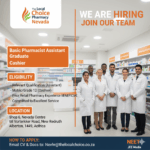The United Arab Emirates (UAE) is a global hub for healthcare, offering state-of-the-art facilities, diverse patient populations, and attractive career prospects for medical professionals. For aspiring or experienced pharmacists looking to practice in this vibrant nation, understanding the precise licensing pathway and job search strategies is paramount. This comprehensive guide will walk you through every step, from initial qualifications to securing your first pharmacy role in the UAE.

1. Understanding the Regulatory Landscape: Your First Critical Step
The UAE’s healthcare system is decentralized, meaning different Emirates have their own health regulatory bodies. Your first decision, therefore, is where you intend to practice, as this dictates which authority you need to license with.
- Department of Health (DOH) – Abu Dhabi: Formerly known as HAAD (Health Authority Abu Dhabi), DOH regulates healthcare professionals wishing to practice in the Emirate of Abu Dhabi.
- Dubai Health Authority (DHA) – Dubai: DHA oversees all healthcare licensing and services within the Emirate of Dubai.
- Ministry of Health and Prevention (MOHAP) – Federal License: MOHAP issues licenses for pharmacists working in the Northern Emirates, including Sharjah, Ajman, Fujairah, Umm Al Quwain, and Ras Al Khaimah. It is a federal license, applicable across these Emirates.
While the general process is similar, there can be subtle differences in required documents, processing fees, and exam content specific to each authority.
2. Essential Eligibility Criteria for Pharmacists in the UAE
Before embarking on the application process, ensure you meet the fundamental requirements:
A. Educational Qualifications
- A Bachelor of Pharmacy (B.Pharm) degree is generally the minimum requirement.
- A Doctor of Pharmacy (Pharm.D) degree is also widely accepted and increasingly preferred.
- Your degree must be from a recognized and accredited university or institution, listed in the World Directory of Medical Schools (WDOMS) or equivalent international standards.
B. Professional Experience (A Non-Negotiable Factor)
- Minimum Experience: Most authorities (DHA, DOH, MOHAP) typically require a minimum of two (2) years of post-registration, full-time clinical or hospital pharmacy experience acquired after your internship or completion of your degree. This experience must be relevant and recent.
- Internship: Your internship year (if part of your degree program) is usually counted towards your educational period, not towards the required post-registration experience.
- Special Cases: In certain situations, recent graduates (e.g., those with less than 2 years of experience) might be considered for “Intern” or “Trainee” pharmacist roles, but these are often directly linked to specific employer programs and come with strict supervision requirements.
C. Language Proficiency
- English: A strong command of the English language is mandatory, as both the licensing exam and daily professional practice are conducted in English.
- Arabic: While not always mandatory, fluency in Arabic is a significant advantage, especially for community pharmacists dealing with diverse local populations.
D. Good Standing Certificate
- You will need a Certificate of Good Standing from your home country’s pharmacy regulatory body, confirming no disciplinary actions or malpractice issues against you.
3. The Step-by-Step Licensing Journey
The licensing process can be broken down into three critical phases:
Phase 1: Primary Source Verification (Dataflow)
- What it is: The Dataflow Group is a specialized third-party service mandated by all UAE health authorities. Their role is to verify the authenticity of your academic credentials, professional licenses, and work experience certificates directly from the primary sources (your university, previous employers, and regulatory bodies). This is a crucial anti-fraud measure.
- Process: You will initiate your application through the chosen health authority’s online portal (e.g., DHA Sheryan, DOH Mumaris, MOHAP Portal). During this, you’ll be directed to submit your documents to Dataflow.
- Documents Required (typically): Degree certificates, academic transcripts, professional license/registration from your home country, experience certificates (detailing dates, role, and duties), passport copy, and recent photograph.
- Outcome: A Positive Primary Source Verification (PSV) report is issued. This report is indispensable for proceeding to the next stage. This step can take several weeks to a few months, so starting early is advised.
Phase 2: The Licensing Examination
- Eligibility: Once you receive your positive Dataflow PSV report, you become eligible to book your licensing exam.
- Exam Providers: Exams are typically conducted by international testing providers like Prometric or Pearson VUE.
- Format: The exam is a computer-based, multiple-choice questionnaire (MCQ). It assesses a broad range of pharmaceutical knowledge, including pharmacology, therapeutics, pharmaceutical calculations, dosage forms, drug interactions, and local healthcare regulations and ethics.
- Preparation: Ample study time is essential. Many online resources, study guides, and mock exams are available. Focus on both clinical knowledge and understanding the specific healthcare context of the UAE.
- Passing Score: A minimum passing score (e.g., 60-70%) is required.
- Attempts: You typically get a limited number of attempts (e.g., three within one year). If unsuccessful, there’s usually a mandatory waiting period before re-attempting.
Phase 3: Final Registration and Licensure
- After successfully passing the exam, you will complete the final application on the respective health authority’s portal.
- Additional Documents: This may include an updated CV, a medical fitness test report (done in the UAE), and any other forms.
- Securing a Job: Crucially, your full license will often only be activated once you secure an employment offer from a licensed healthcare facility (hospital or pharmacy) in the same Emirate. Your employer will usually assist in the final steps of your license activation and visa sponsorship.
4. How to Get a Job as a Pharmacist in the UAE
Securing employment is intertwined with the licensing process. Here’s a strategic approach:
A. Timing Your Job Search
- Pre-Licensure: Many pharmacists begin their job search after completing their Dataflow verification and before or after passing the licensing exam. Having your PSV report and/or exam results makes you a much stronger candidate.
- Networking: Leverage professional networks on LinkedIn, attend online webinars, and connect with pharmacists already working in the UAE.
B. Key Job Search Platforms
- Online Job Portals: Major platforms like LinkedIn, Bayt.com, NaukriGulf.com, GulfTalent.com, and indeed.ae are primary sources for job listings. Filter by “Pharmacist” and your preferred Emirate.
- Hospital Career Pages: Directly check the career sections of major hospital groups (e.g., Aster DM Healthcare, NMC Healthcare, Mediclinic, Cleveland Clinic Abu Dhabi, American Hospital Dubai, King’s College Hospital Dubai).
- Pharmacy Chains: Explore career opportunities with large community pharmacy chains (e.g., Boots, Life Pharmacy, BinSina Pharmacy).
- Recruitment Agencies: Several specialized healthcare recruitment agencies in the UAE assist foreign candidates. Be cautious and verify their legitimacy.
C. Crafting a UAE-Ready CV and Cover Letter
- Highlight Experience: Emphasize your clinical or hospital pharmacy experience and specific skills relevant to a modern healthcare setting (e.g., medication reconciliation, patient counseling, inventory management, sterile compounding).
- Licensing Status: Clearly state your licensing status (e.g., “DHA-eligible, Dataflow completed, Exam Passed” or “MOHAP Licensed Pharmacist”).
- Professional Photo: Include a professional passport-sized photo, which is standard practice for CVs in the Middle East.
D. The Interview Process
- Interviews may be conducted remotely (video calls) initially, followed by in-person interviews if you are in the UAE.
- Be prepared for questions on clinical scenarios, local drug regulations, ethics, and your commitment to patient safety and customer service.
E. Visa and Relocation
- Once you receive a job offer, your employer will typically sponsor your work visa.
- They will guide you through the medical fitness test, residency permit application, and other necessary relocation procedures.
5. Estimated Costs and Timelines
- Dataflow Verification: Approximately AED 1,000 – AED 1,500 (can vary).
- Licensing Exam: Approximately AED 200 – AED 500 (can vary by authority).
- Final License Registration: Approximately AED 1,000 – AED 2,000 (can vary).
- Total Processing Time: From Dataflow initiation to final license activation can range from 3 to 9 months, depending on efficiency, document availability, and exam scheduling.
Conclusion
Becoming a pharmacist in the UAE is a rewarding endeavor that offers professional growth and a high quality of life. While the process is rigorous, a systematic approach, thorough preparation, and perseverance will pave your way to a successful career in one of the world’s most dynamic healthcare landscapes.

